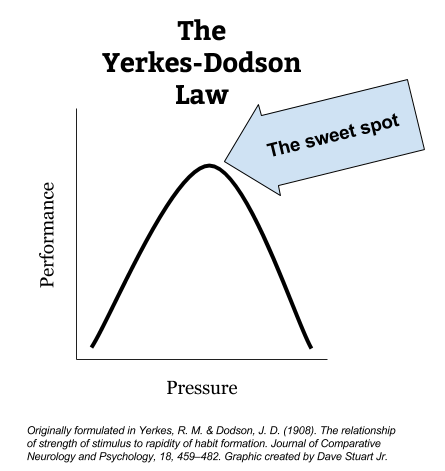“Young people should not be overdemanded. However, we have also to consider the fact that at least today, in the age of an affluent society, most people are underdemanded rather than overdemanded.”
– Viktor Frankl, emphasis mine (1966)
In the excerpt above, Frankl touches on a timeless educator challenge: for the folks we teach to optimally grow, they need to be optimally challenged.
It's the Yerkes-Dodson law — perhaps the most important observation about human performance psychology has ever given to our profession.

Frankl, Yerkes, and Dodson are describing a law that we see as much in our classrooms as Socrates did in his millennia ago. In human performance, there's a kind of Goldilocks Zone where folks perform best. You and I will see our students grow best when they're neither over- nor under-pressured.
The difficulty here, of course, is that each student experiences pressure (or, in Frankl's language, demand) differently. At the point I'm at in my career (roughly halfway through), I'd say this is probably the greatest challenge of teaching at a public high school. By ninth grade, the range in student preparedness is truly massive. This isn't the “fault” of preceding teachers; it's what's going to happen in a nation as cosmopolitan and individualistic and unequal as ours. I'm not bringing a critique of our society here; I'm just bringing an observation. The older students get, the greater the differences become in what they've learned and practiced.
It's why I get paid to do my job: because it's hard and not just anyone can do it.
I'll close by saying that I picked Frankl's quote because I think, in the 2020s, our profession probably errs in the direction Frankl is indicating. In light of COVID, in light of inequity, in light of social-emotional learning, I do find that many of my students are especially hungry for a fair challenge. They want to be taken seriously — to have much expected of them in school, to be taught as if they are highly capable of learning and growth.
You can't be a heartless jerk with high expectations. The quality of your teaching has to at least match the level of your expectations. And you've got to know how to identify when exceptional students are either crushed or bored by expectations too high or too low for them.
But do expect much, just as you would of your own children.
Best,
DSJR
Leave a Reply